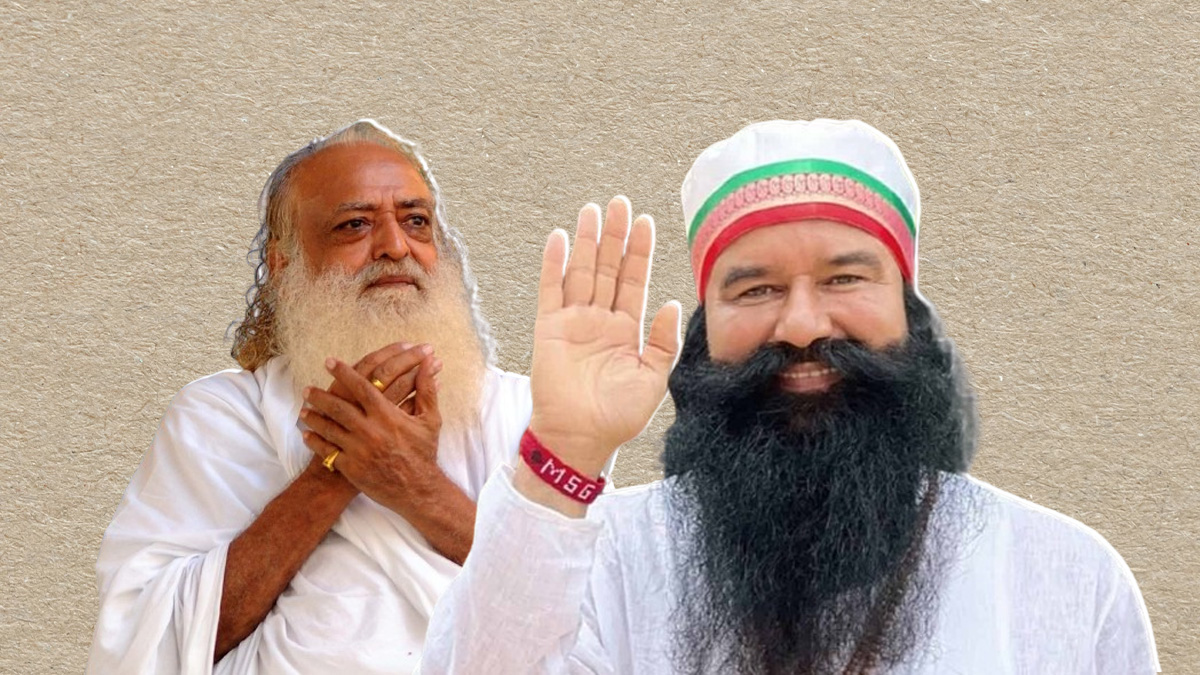
In a tragic incident on July 2, 2024, in Hathras, Uttar Pradesh, around 121 individuals lost their lives in a stampede during a religious gathering. The devotees who died, amidst the chaos, suffocated as they were dispersing from a 'Satsang' conducted by a religious figure, or ‘godman’ Suraj Pal in Phulrai village. The spiritual leader Suraj Pal, is popularly known as ‘Narayan Sakar Hari’ or ‘Bhole Baba’.
Among the deceased were 114 women and seven children. Reports suggest that Baba Suraj Pal had a massive female following, who thronged to his ‘Satsangs’ eagerly to see him in person and listen to his sermons. With minimal digital presence, the Baba encouraged in-person participation in his sermons. Estimates suggest that there were over two lakh attendees at the Hathras Satsang. According to officials, the stampede occurred when devotees rushed to touch Baba’s feet or collect the dust from his feet as he was leaving, which resulted in the tragic event.
Baba Suraj Pal is not the only self-proclaimed ‘Godman’ with an ardent and devoted fan following. 
Indians have had a long and complicated relationship with spiritual leaders or Godmen. Saints, sages, and gurus have been mentioned and revered throughout history. Followers rely on these leaders for spiritual guidance, and often even for relief from physical ailments.
Interestingly, many Babas in India, who are often self-proclaimed ‘Godmen’, enjoy a significant female following. Ground reports and research by experts quoted in this article have shown women turning to them for cures ranging from the emotional to the spiritual. They headed to Babas in an attempt to fulfil their desire for male children, and to find a cure for schizophrenia. The phenomenon is specifically prevalent among rural women. However, many of these Godmen have been embroiled in controversies surrounding sexual exploitation and rape.
HerZindagi tried to explore the complex relationship of women with Godmen in India.
Surinder S. Jodhka, Professor of Sociology, Centre for the Study of Social Systems, School of Social Sciences, Jawaharlal Nehru University, Delhi, highlighted the aspect of restricted physical mobility that often draws women to these Satsangs and Babas.
“I think one of the reasons why women are more committed followers is that it involves going out and mobility,” he said.
Read: Leisure as Liberation: Redefining Women's Leisure Through a Feminist Lens
India doesn’t have any leisure culture, so pilgrimage is often seen as leisure, he explained. “Since we don't have a culture of going out, travelling and going on vacations, many use the excuse of a pilgrimage as a legitimate reason to go out. For women, going out on their own and mobility is even more difficult, so they seek this legitimacy much more,” he added.
Initially, these visits to ‘deras’ or ‘Satsangs’ become outings that women look forward to. Later, women often visit there with neighbours or relatives, fostering a sense of community.
Smita Chakraborty, a sociologist, highlighted that 69% of India falls under the rural belt, where women significantly lack formal education. Even if they avail education, for many reasons, they tend to drop out early for several reasons.
“Their socialisation is such, that they're made to believe that they are the forebearers of 'Lakshmi', or Goddess of fortune in the house. To avoid stigmatisation from society, they follow rules and regulations laid down for them,” she said.
This is where religion becomes an important part of their lives. 
“Most of them lack economic independence, and most of them believe religion to be a very powerful tool, that can protect them from any harm, negative influence or 'nazar' (evil eye). They believe that they may not be the breadwinners of the family, but they are the breadmakers and protectors of the family. They think godmen will provide them with mantras or ways to be the protectors of the family - their way of contributing to family life,” she explained.
On another level, visits to Babas, are connected to the ‘household economy’. Through their visits, the women seek help from the Babas to cure household woes.
“Lots of women had husbands who had become drunkards or drug addicts. They would want to go to the Babas and take their husbands with them, and then make them promise the Baba that they would stop drinking,” said Professor Jodhka based on his research in Punjab. This often seems like the easiest way to convince their husbands to stop indulging in harmful habits.
Ground reports from various Babas indicate that people seek cures for physical and mental ailments, ranging from kidney stones to schizophrenia.
Professor Jodhka, during his visits to Punjab, discovered that women often believed that these Babas possessed divine powers.
“Many women would also go to these Babas because they don't have a male child, and they believe that Baba could fulfil their desire of having a son, or any other ‘mannat’ (wish) they had,” he added.
During his travels, Professor Jodhka encountered a dera in Gurdaspur, Punjab, where followers believed that if they went to bathed in the shower at 4 o'clock in the morning in winter, they’d be sure to conceive a son.
The babas often feed off fear. People go to them in times of crisis, and they capitalise on their vulnerabilities.
Another factor is that women don’t easily find their concerns heard or acknowledged.
“Men in the family do not lend a patient ear to the women. With the men often having know-it-all personas, women's voices often go unheard. The godmen capitalise on that, and act as a channel where the women can express their inner desires,” highlighted Smita.
Also read: Urban Isolation: Why Urban Indians Are Growing Increasingly Lonely and Potential Solutions
In a research paper, Professors from Punjab University observed that it was the human quest for miracles that drives people to Godmen. They based their observations in an urban context. “We want miracles to happen to us, particularly, when we are surrounded with insurmountable odds resulting in hopelessness and despair. A persisting problem, lack of awareness, financial, physical or social constraints, a failed support system and an environment fed on blind faith lead us to an address which offers hope, instant gratification and a promise of a miracle. Corruption and favouritism in India have shattered a common man's belief in talent and merit, pushing him to surrender to the concept of luck and believe in miracles,” they stated.
Bhole Baba, whose satsang witnessed the tragic stampede, was a member of India's Dalit community. He claimed he was aiming to establish a society devoid of superstition and filled with compassion. Many of Bhole Baba’s followers were reportedly Dalits or from lower castes.
In a highly fragmented society, Professor Jodhka during his fieldwork discovered, that in Sirsa, Haryana, significant people were going to the Dera, in desperate search of community life. “Local context had become fragmented and bitter,” he highlighted. Conflicts between brothers, extended family, and caste hierarchies led to fragmentation and further conflict.
“The possibility of being together across caste groups was an attraction. While visiting these deras, they’d find that kind of solidarity. People from lower OBCs, or even Dalits, travel along with members of dominant castes. The upper caste people would often be the ones feeling marginalised and anonymised in local contexts due to circumstances. So they’d travel together and connect,” Professor Jodhka explained.
People also seek answers to questions on existence and purpose, as these insecurities have increased with the changes in societal life brought about by modernisation.
In most cases, following these Babas or spiritual leaders is an addition to other religious activities.
Poverty, illiteracy, and belief in superstitions further propel women to seek refuge and relief from Babas.
One aspect of the complexities surrounding women’s adulation for these ‘Godmen’, is that many of them have been accused of sexual misconduct and even rape.
Self-styled preacher Pastor Bajinder Singh was sentenced to life imprisonment by a court in Punjab's Mohali for a 2018 rape case, on April 1, 2025. The 42-year-old, known as the "Yeshu Yeshu prophet," was held in Patiala jail after being convicted under IPC Sections 376 (rape), 323 (voluntarily causing hurt), and 506 (criminal intimidation).
The case stemmed from a 2018 complaint filed at Zirakpur police station, where a woman accused Singh of luring her with promises of taking her abroad. She alleged that he raped her at his Mohali residence in Sector 63, recorded the act, and later threatened to share the video on social media if she did not comply with his demands.
For instance, Swami Nithyananda, founder of the Nithyananda Dhyanapeetam, faced multiple accusations of sexual abuse and even charges of kidnapping and wrongful confinement. His controversies have spanned international borders, with legal battles and allegations surfacing both in India and abroad.
Another prominent case involved Asaram Bapu, who was convicted in 2018 of raping a minor girl at one of his ashrams. Known for his vast following and spiritual discourses, Asaram Bapu faced a prolonged trial that culminated in a life sentence, sparking debates on the unchecked power and influence wielded by such spiritual leaders.
Gurmeet Ram Rahim Singh, leader of the Dera Sacha Sauda, was convicted in 2017 for raping two of his female followers. His case not only highlighted the allegations of sexual exploitation but also revealed the cult-like devotion and fear that surrounded him, leading to widespread protests and violence in parts of North India.
According to reports, Bhole Baba, whose satsang in Hathras, faced legal challenges in 1997 related to allegations of sexual assault and even served time in prison. Upon release, he re-branded himself and became a spiritual leader.
Research conducted by Janja Lalich, in 1997, described the prevalence of the sexual exploitation of women in cults. Even though the context is geographically different, many aspects are relevant to the Indian scenario. Lalich wrote, “This (sexual exploitation) may take the form of daily controls of sexuality and sex lives or more overt abuses such as arranged marriages, forced sexual activity with the leader, and rape. Sexual control is seen as the final step in the objectification of the cult member by the authoritarian leader who is able to satisfy his needs through psychological manipulation leading to sexual exploitation.”
Despite the repeated misconduct of these babas on several occasions, they continue to enjoy a massive following. Sociologist Smita Chakraborty, said that many followers, due to their lower levels of education, lack awareness about these criminal activities.
On July 22, #DemandFairTrial was trending on Twitter, where followers of Asaram Bapu rallied for him being innocent. Many of these accounts posted videos and clips claiming that he was fabricated in a false case.
Sant Shri Asharamji Bapu के केस को अब 11 से अधिक वर्ष हो गए हैं। फिर भी fake case होते हुए भी उनको न्याय नहीं मिल रहा है?
— Titū Mēēñā 🇮🇳 (@Titu_jamidar___) July 22, 2024
उनको न्याय मिले।#DemandFairTrialhttps://t.co/vLupLdcnsWpic.twitter.com/b2RyHOHi4h
Followers of Ram Rahim highlight schemes started by him and their benefits even today.
#Sahara_E_Insan A initiative initiated by Ram Rahim Ji to provide financially & emotionally support to families who have lost the head of their family or only son of the family. Volunteers of Dera Sacha Sauda helping such families with a great passion !! pic.twitter.com/2oggeTSUPT
— It’s Me Neha 👩🏫 (@NehaMutreja3) July 19, 2024
many people cannot provide basic and quality education to their children. Under Ram Rahim Ji's #RightToEducation campaign, essential stationery items are provided to children from needy families. These children also receive free education and career counseling etc. pic.twitter.com/6eWKYZ9iHl
— kajal arora (@kajal7775) July 23, 2024
This lack of awareness is demonstrated by violence breaking out when police attempted raiding their ashrams, or protests following their convictions, resulting in reactions that are complex and layered. Followers are often so blinded by their devotion that they dismiss incriminating evidence being proven. Surprisingly, followers resort to violence, when the babas unanimously claim to preach non-violence.
Also watch this video
Herzindagi video
Our aim is to provide accurate, safe and expert verified information through our articles and social media handles. The remedies, advice and tips mentioned here are for general information only. Please consult your expert before trying any kind of health, beauty, life hacks or astrology related tips. For any feedback or complaint, contact us at [email protected].